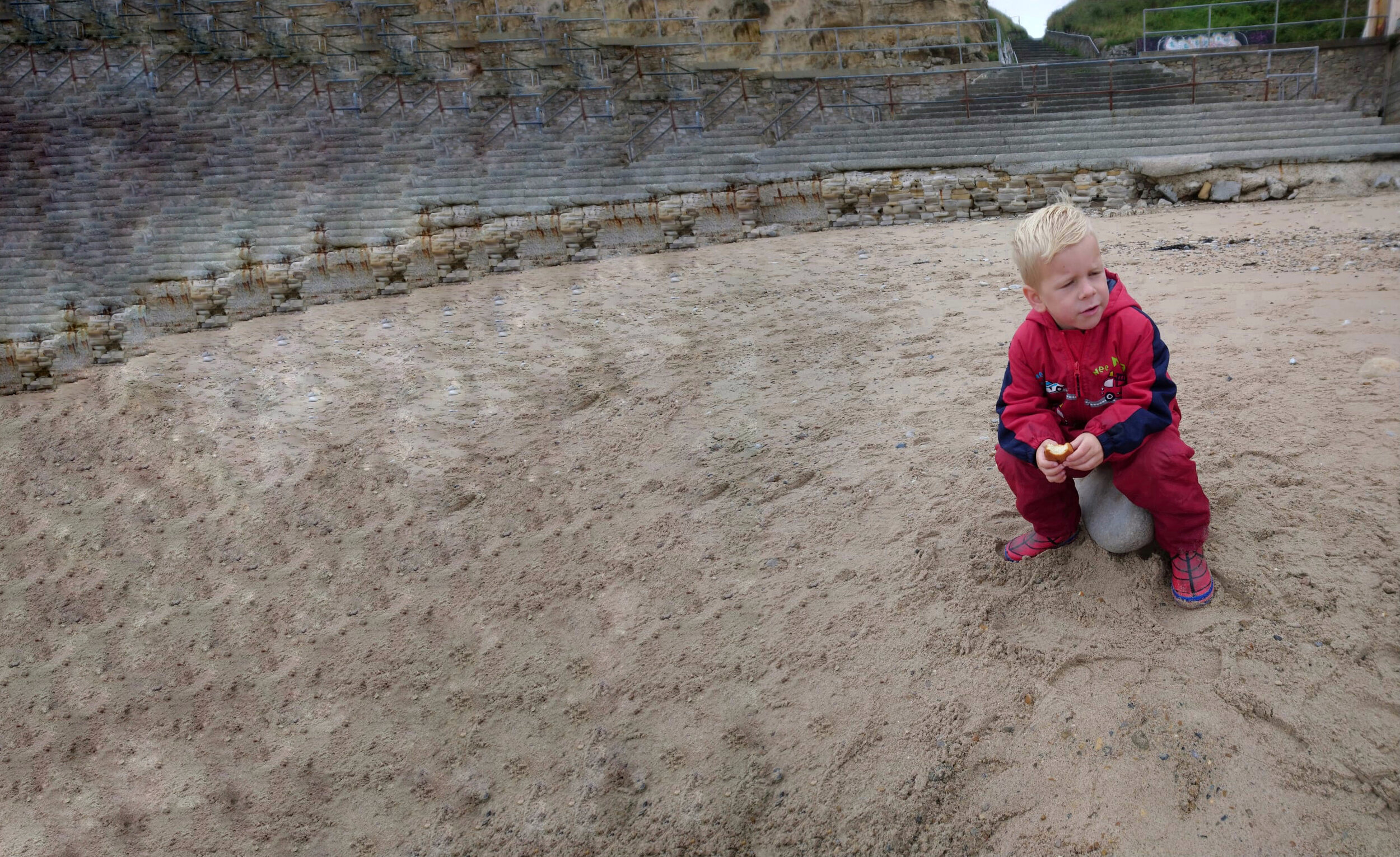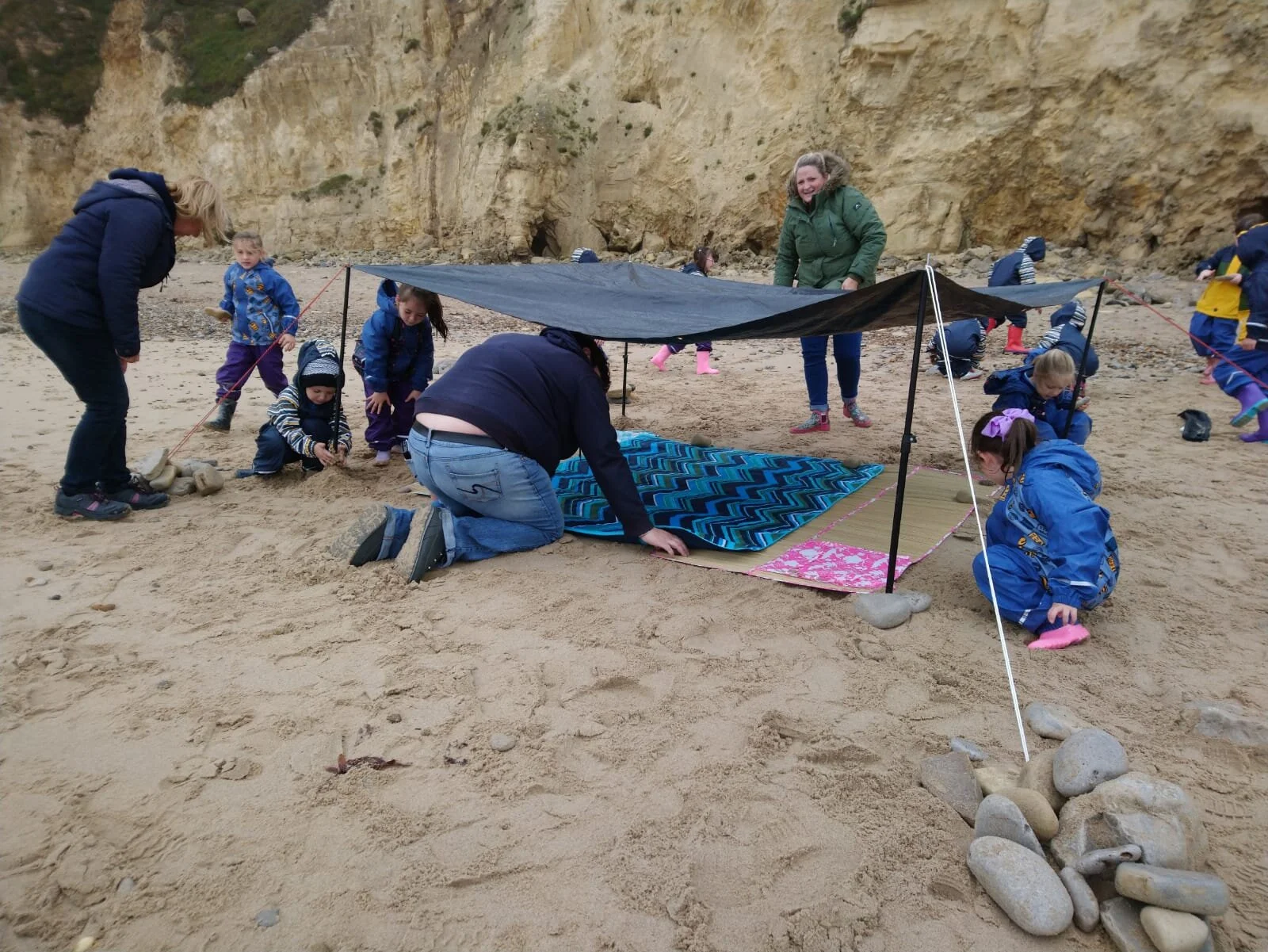
School Bespoke Events!
Bespoke sessions are available to primary schools for any year group or choose from our standard Beach School sessions below
Too much to organise, too much to plan - then we’ll take care of it for you! Planned, risk assessed and delivered
Duration - 2 hours or upon request. All sessions are risk assessed and plans written and provided for Educational Visits (EV). Please contact us for further details of pricing and groups. Funding may be available for transport – please ask at time of booking
Shelter Building
Can you work together to build a shelter from the elements (sun, rain or wind)? Learn how to use rock and sand anchors and other natural resources found on the beach.
Sensory Exploration
Immerse yourself in the exploration and experiences of the sights, sounds, smells and feel of the natural marine environment through games, blind fold walks and ‘ME’ time mindfulness
Fire Lighting
Learn how to use what is around you to prepare and create an open fire. Practice how to make a spark using a ‘fire steel’ tool and how to keep the fire burning. Toast marshmallows around the open fire!
Rock pool Exploration
Who lives in this environment, who eats who and how to the marine creatures adapted to survive there?
Beach Art
Use natural materials to create your own works of Art – pebbles, seaweed, shells, wet sand, driftwood etc. Try using sticks or rocks as a drawing implement or firm damp sand as your sketch pad…
Beach Games
Challenge yourself to invent new games using whatever natural materials found on the beach. Try the ‘old favourite’ of skimming stones over the calm waters; it’s not as easy as it looks!
Citizen Science/Bio blitz
Can you help scientists and Trusts look for and record information about marine wildlife and habitats? Join in the Big Seaweed Search or Marine Conservation Society surveys. Look at litter/pollutants on our shores and do a ‘Litter Sweep’ of the beach.
Christmas Winter Warmer session
Held in the grounds of your school. No need to travel - we come to you! Fire lighting and toasted marshmallows -1 hour session OR a 2 hour session including the making of a Christmas decoration to take home
End of Term Class Treat
Escape the classroom and head to the beach! Start the holiday early and make it fun and memorable. We’ll provide the activities, resources and even write the EV form/risk assessment for you!

Bringing learning ALIVE!
Tides of Change Coastal School makes it easy to take a class on to the beach. Where schools may dismiss the idea because there is too much to organise and plan – we take care of it all. Schools, families and organisations can just turn up on the day and everything is taken care of.
We will make it easy to embark on an outdoor learning programme. Our qualified Coast School Leader will work closely with the group leader to ensure that they will have suitable relevant content in the session, be it a curriculum based subject, a topic or theme or even a holiday session.
The responsibility of planning the session will lie entirely with the Coastal School Leader and the group leader can enjoy the session, safe in the knowledge that their input will be included in the planning of it.
Curriculum Based Learning
There are any number of curriculum-based subjects that we can plan a Tides of Change beach session around, tying in with the National Curriculum and simultaneously stimulating and engaging children’s learning in the natural environment.
Some examples of Learning in the Natural Environment in the New National Curriculum include:
PHSE School Curriculum
How to keep safe at the beach.
Work together as a team or pair, listening and considering others ideas and views.
How do you feel when exploring at the beach, designing a shelter, walking barefoot on the sand/pebbles/seaweed etc – It’s Good to be Me!
Building good relationships and self-assurance
Behaviour, Social and Emotional Needs
Overcoming barrier to learning so children can participate with their peers in the classroom
Key Stage 1
Science: Plants
Pupils should be taught to: identify, name and describe a variety of plants including deciduous/evergreens/flowering plants/trees & their structures – fauna and flora in sand dunes and seaweeds in rock pools
Science: Seasonal Changes
Pupils should be taught to: observe changes across the four seasons, describing the weather associated with the seasons and how day length varies
Science: Animals
Identify, name, draw & label the basic parts of the human body & say which part of the body is associated with each sense
Maths: Statistics
Pupils should be taught to: interpret/construct simple pictograms, tally charts, block diagrams, simple tables – ask/answer simple questions by counting objects and comparing data – surveys or Bio Blitz
English: Punctuation/Grammar
Expanding noun phrases to describe and specify – experiences and feelings, environments and living things seen
English: Foundation Reading
Listening to and discussing a wide range of poems, stories and non-fiction at a level beyond that at which they can read independently

Experiences and feelings, incredible environments, living things encountered
English: Speaking & Listening
Listen and respond appropriately and ask relevant questions. Maintain attention and participate in activities
Design and Technology
Building structures and exploring how they can be made stronger, sturdier and more stable.
History
Pupils should be taught about events beyond living memory that are significant nationally or globally
Geography: Skills and Field Work
Use world maps, atlases and globes to identify the UK and its countries, as well as the countries, continents and oceans
Art & Design
Develop a wide range of art and design techniques is using colour, pattern, texture, line, shape, form and space
Key Stage 2
Science: Living things and habitats
Describe how animals, obtain their food from plants and other animals, using the idea of a simple food chain and identify and name different sources of food.
Science: Light
Pupils should be taught to: recognise that shadows are formed when the light from a source is blocked by a solid object.
Science
Working scientifically - ask / answer questions; set up practical enquiries / fair tests; make observations; take measurements; gather, record, classify, present, record, report data and findings in a variety of ways; use results to draw conclusions; make predictions; suggest improvements; raise further question – in relation to changes in tidal flow and direction whilst on the beach
Maths
Convert different units of measure; estimate, compare / calculate different measures; read, write, convert time between analogue and digital; solve problems involving converting time in relation to tidal times
Maths: Statistics
Pupils should be taught to: interpret/construct simple pictograms, tally charts, block diagrams, simple tables – ask/answer simple questions by counting objects and comparing data – surveys, BioBlitz
English: Reading Comprehension
Increasing their familiarity with a wide range of books, including myths, legends and traditional stories, modern fiction, fiction from out literary heritage, and books from other cultures and traditions.

Geographical vocabulary to refer to local and familiar features that can be seen from the coastal area/beach
Art and Design
Improve their mastery of art and design techniques, including drawing, painting and sculpture with a range of materials
Cooking and Nutrition
Understanding seasonality, and know where and how a variety of ingredients are grown, reared, caught and processed
Geography: Human/Physical
Describe and understand key aspects of: physical geography, including climate zones, biomes and vegetation belts, rivers, mountains, volcanoes and earthquakes, and the water cycle
Use basic geographical vocabulary to refer to local & familiar features that can be seen from the coastal area/beach
Design & Technology
Use range of tools & materials to complete practical tasks. Technical knowledge - apply understanding of how to strengthen, stiffen and reinforce more complex structures - what type of sand suits shelter building, how can we stabilise ropes and tarpaulin?
Physical Education
Take part in outdoor and adventurous activity challenges; compare performances and make improvements when designing and erecting shelters













